#mark antony’s oration
Explore tagged Tumblr posts
Text

Source
1 note
·
View note
Text

pharsalia 10.421-4 trans. wilson joyce
this is A Treat For Me Specifically also ok they Don't kill caesar at a banquet but is anyone else getting weird odyssean ghostly inversions from this. anyone. anyone. and also the classic Roman Civil War Severed Head On The Banquet Table image. yippeeeeee
#this doesn't quite fit on my cannibalistic tyranny momence post but it is adjacent.#antonius orator + marius + cicero + mark antony severed head timeloop. you know how it is#upon what meat doth this our caesar feed#pharsaliabookclub#pharsalia#beeps
11 notes
·
View notes
Text
Not to (once again) mine Ancient Roman history for ASOIAF content but someone should draw Joffrey Lannister with Ned Starks head in the style of Fulvia with the head of Cicero (esp where she's sticking golden hairpins in his mouth):
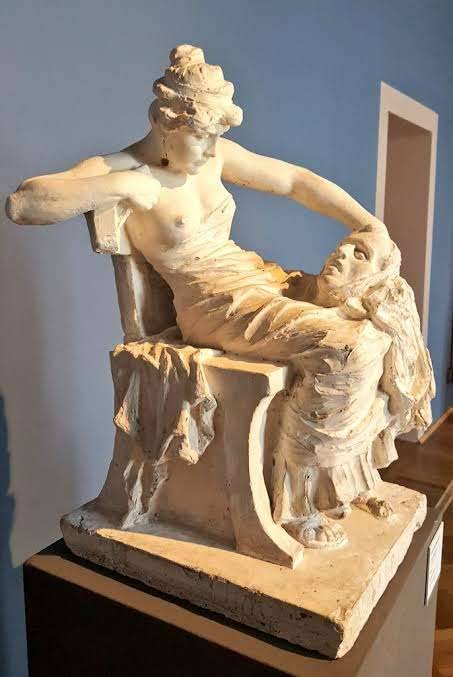


Like Joffrey was furious at Ned's implication that he wasn't Robert Baratheons son. I feel like he was angrier at that than at the bastardy and incest allegations somehow!!! Which uh. Is interesting someone should explore that.
#if u dont know the backstory for the fulvia thing#mark antony and cicero were beefing when the republic fell#cicero orated a series of speeches against Mark Antony called the phillipics#Fulvia was Mark Antonys wife and (allegedly according to Cassius Dio) after Cicero was beheaded#she stuck her golden hairpins into ciceros tongue as a ~final revenge against his power of speech~#joffrey lannister#joffrey baratheon#also is there also something there about how the starks are generally known for like being strong men type politicians (see cregan)#and ned manages to destabilize the whole realm through the power of speech/writing?
8 notes
·
View notes
Text
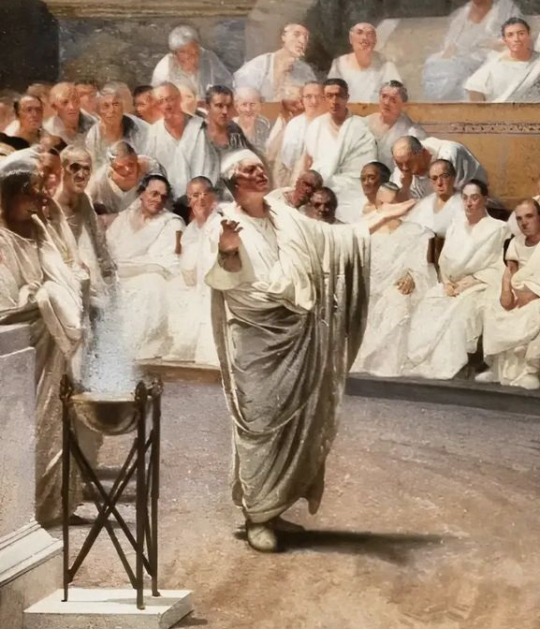
'I only long for a couple of things: first, to free, upon my death, the Roman people; This will be the greatest favor that the immortal gods can grant me; the second, that what happens to each one is what he deserves according to the good or evil he has done to the republic. ' (M. T. Cicero, Philippicae, II)
Cicero wrote this Philippic when he already knew that he would soon be executed by the Second Triumvirate.
Marcus Tullius Cicero (January 3, 106 BC - December 7, 43 BC) was a Roman politician, philosopher, writer and orator. He is considered one of the greatest rhetoricians of the Roman Republic.
Following Caesar's assassination, in which Cicero had no part, he became an enemy of Mark Antony, attacking him in a series of speeches. He was proscribed as an enemy of the state by the Second Triumvirate - Octavian/ Augustus, Mark Antony and Lepidus- and executed by soldiers after being intercepted while trying to flee to the Italian peninsula. On 7 December 43 BC the Triumvir Mark Antony ordered his assassination and that his head and hands be displayed on the rostra in the Forum.

Cicero, consul in 63 BC, depicted in an 1889 fresco by Cesare Maccari, denouncing Catiline's conspiracy to overthrow the Republic and exposing his conspiracy before the Senate. When conspirators within the city were later arrested, Cicero referred their fate to the Senate, triggering a debate in which Caesar as praetor-elect participated.
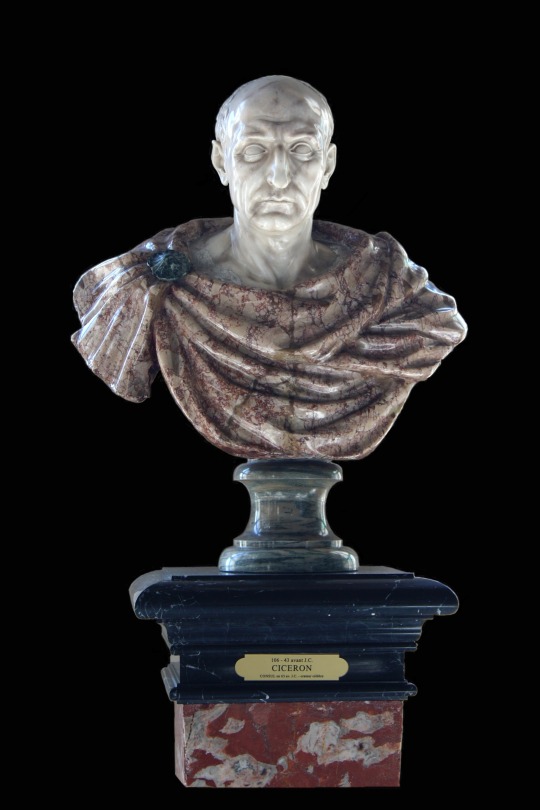
Cicero, like Cato the Elder, was a so-called Homus Novus (new man). In ancient Rome, this was the name given to a politician, specially a Consul, who had no one in his family who had held public office; that is, he made his career not through family influence but on his own.
During the Middle Ages and the Renaissance Cicero was held in high esteem and his prestige increased during the Enlightenment of the 18th century. His works are among the most important from the last days of the Roman Republic.
63 notes
·
View notes
Text
Mark Antony's Origin and Ancestry

"The gens Antonia was by no means one of the great and illustrious families of the Roman magistracy nobility. The first member of the Antonian family to achieve high honor was M. Antonius, magister equitum in 334 BC. However, that was long in the past, and it is unclear whether a vivid memory of this ancestor persisted within the Antonian household. He was revered, but little was truly remembered about him. The Antonians could not even remotely compare themselves with the glory of great families like the Fabii or Cornelii, nor were they blessed with material wealth. They were also not patricians but plebeians, and they held no prominent position even within the plebeian nobility. Antonius, the Triumvir, was acutely aware of this fact, which is why he sought to change it. As was not uncommon during the late Republic, he traced the genealogy of his house to a hero, Anton, the son of Hercules. While this was a myth, the connection to a mythical ancestor aligned perfectly with the spirit of the time, where people sought to incorporate gods into their earthly families to magnify the glory of their lineage. However, this development came later; the ancestors of M. Antonius were unaware of it and likely had ample reason to complain about the arrogance of the old aristocratic families, especially since the Antonians only achieved the consulship relatively late. This was only accomplished by the Triumvir’s grandfather, M. Antonius, who gained fame and recognition as a trial orator, in 99 BC."
Hermann Bengston, Marcus Antonius Triumvir und Herrscher des Orient
NB: Counter against military historian Adrian Goldworthy's propaganda against Antony's family to portray him as a talentless, entitled elite in his book Antony and Cleopatra and various other places.
#mark antony#marcus antonius#marc antony#rome#roman history#ancient rome#roman republic#roman empire#antony and cleopatra
22 notes
·
View notes
Photo
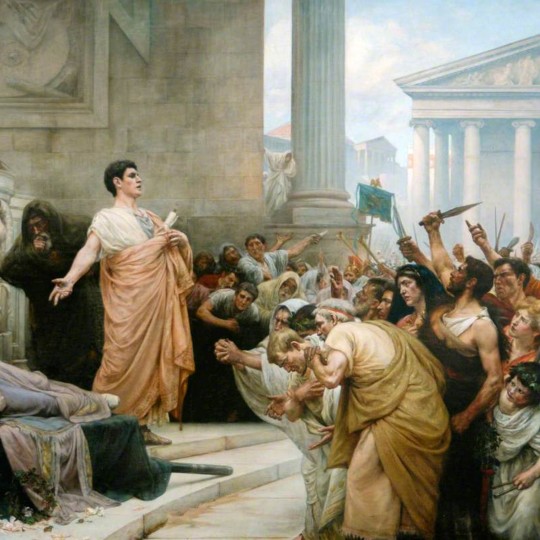
Mark Antony's Oration at Caesar's Funeral
Amid the chaos and strife following the assassination of Julius Caesar in 44 BCE, Mark Antony (83-30 BCE), with the advice of Cicero, persuaded the Roman Senate to declare an amnesty which pardoned the Liberators and accepted the legitimacy of Caesar's dictatorship. A public funeral followed, at which Antony delivered his famous funeral oration, a significant first step in his assertion of independent political authority in Rome.
Continue reading...
73 notes
·
View notes
Text
Historical parallels between Roman Empire and Berserk
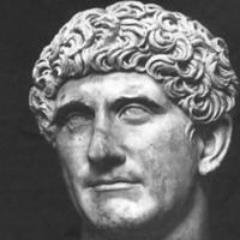

Casca was originally a Roman Man:
Publius Servilius Casca
Publius Servilius Casca Longus (died c. 42 BC) was one of the assassins of Julius Caesar. He and several other senators conspired to kill him, a plan which they carried out on 15 March 44 BC. Afterward, Casca fought with the liberators during the Liberators' civil war. He is believed to have died at the Battle of Phillipi either by suicide or by Octavian's forces.
Despite his being initially a childhood friend of Caesar, Casca and his brother Titedius joined in the assassination. Casca struck the first blow, attacking Caesar from behind and hitting his bare shoulders, after Tillius Cimber had distracted the dictator by grabbing his toga. Caesar replied "Casca, you villain, what are you doing?" and tussled with him for several seconds. Casca simultaneously shouted to his brother in Greek, "Brother, help me!" The other assassins then joined in.
Casca joined Marcus Junius Brutus and Gaius Cassius Longinus, the leaders of the assassins, during the Liberators' civil war against the Second Triumvirate, Caesar's former supporters.
Casca is commemorated on a coin along with Brutus, in which a bearded figure is depicted next to his name. However, this appears to be the god Neptune rather than a portrait of Casca.
Neptune is the Roman god of freshwater and the sea in Roman religion. He is the counterpart of the Greek god Poseidon.
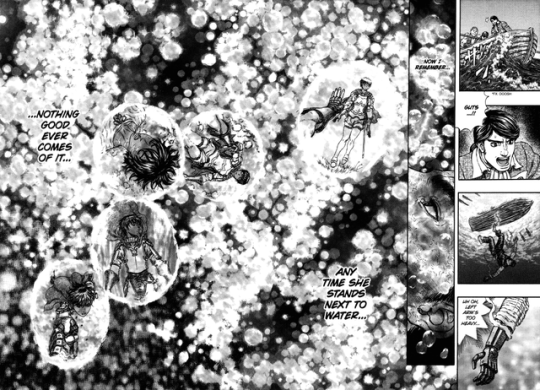
Guts: "Anytime she stands next to water, nothing good ever comes of it ..."

Calpurnia was either the third or fourth wife of Julius Caesar, and the one to whom he was married at the time of his assassination. According to contemporary sources, she was a good and faithful wife, in spite of her husband's infidelity; and, forewarned of the attempt on his life, she endeavored in vain to prevent his murder. Her contemporaries describe Calpurnia as a humble, often shy woman. The night before his assassination, Calpurnia dreamed that Caesar had been wounded, and lay dying in her arms.
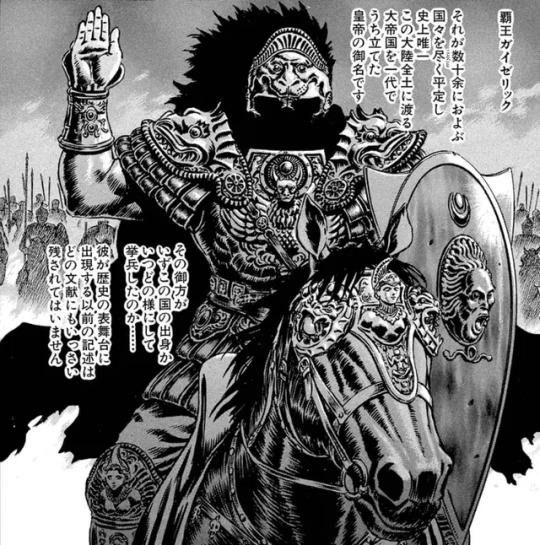
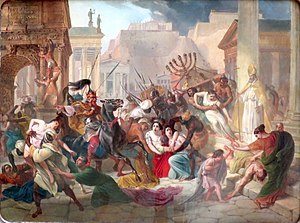
Gaiseric (c. 389 – 25 January 477), also known as Geiseric or Genseric was king of the Vandals and Alans from 428 to 477. He ruled over a kingdom and played a key role in the decline of the Western Roman Empire during the 5th century.
(Sack of Rome in 455) Gaiseric's invasion was a devastating blow to the empire itself, so much so that historian Michael Grant claims, "Gaiseric contributed more to the collapse of the western Roman Empire than any other single man."
Before Gaiseric marched upon Rome, Pope Leo I implored him not to destroy the ancient city or murder its inhabitants.
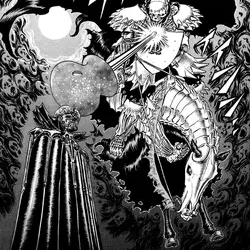
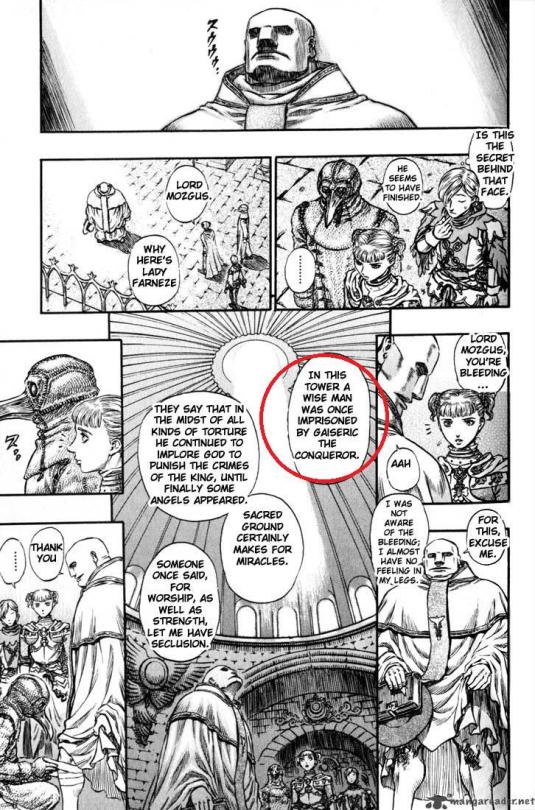
Gaiseric agreed and the gates of Rome were thrown open to him and his men. Once inside the city, the invaders plundered it thoroughly, including the Jupiter Capitolinus temple "Gaiseric contributed more to the collapse of the western Roman Empire than any other single man."

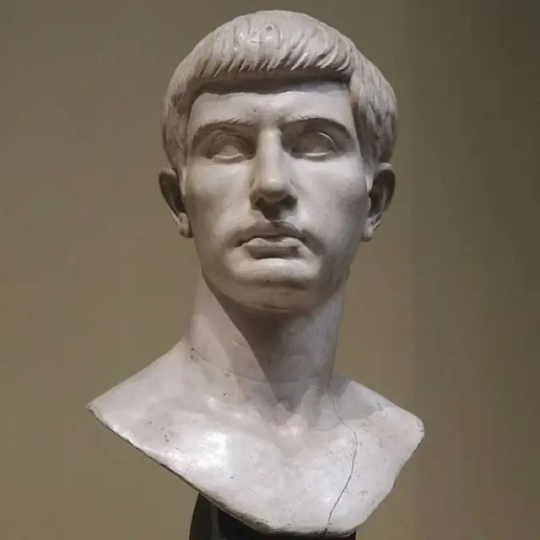
Marcus Junius Brutus was a Roman politician, orator, and the most famous of the assassins of Julius Caesar. He also was close to Caesar. Brutus eventually came to oppose Caesar and sided with Pompey against Caesar's forces during the ensuing civil war (49–45 BC). Pompey was defeated at the Battle of Pharsalus in 48, after which Brutus surrendered to Caesar, who granted him amnesty.
With Caesar's increasingly monarchical and autocratic behaviour after the civil war, several senators who later called themselves liberatores (liberators), plotted to assassinate him.
Popular unrest forced Brutus and his brother-in-law, fellow assassin Gaius Cassius Longinus, to leave Rome. After a complex political realignment, Octavian – Caesar's adopted son – made himself consul and, with his colleague, passed a law retroactively making Brutus and the other conspirators murderers. This led to a second civil war, in which Mark Antony and Octavian fought the liberatores led by Brutus and Cassius. The Caesarians decisively defeated the outnumbered armies of Brutus and Cassius at the two battles at Philippi in October 42. After the defeat Brutus took his own life.
His name has been condemned for betrayal of Caesar, his friend and benefactor.
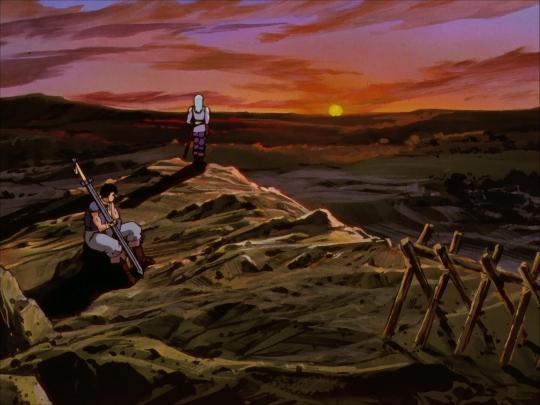
Et tu, Brute?
#berserk#berserk theory#roman empire#casca#brutus#caesar#gaiseric#skull knight#charlotte#griffith#guts#historical#berserk history#berserk reddit#anime#berserk manga#history#berserk guts#berserk casca#kentaro miura#ベルセルク#guts berserk#et tu brute#shakespeare#julius caesar#casca was male#berserk fan theory
37 notes
·
View notes
Text
youtube
Julius Caesar - William Shakespeare (ITALIAN)
The drama is presented here in the version broadcast for the first time on the Rai National Program (currently Rai Uno) on 1965 directed by Sandro Bolchi. Performers: Glauco Mauri, Luigi Vannucchi, Raoul Grassilli, Glauco Onorato, Gigi Reder, Lucilla Morlacchi, Sergio Graziani, Edoardo Torricella, Dina Sassoli, Aldo Massasso, Gino Rumor, Piero Ciccoletti, Giuseppe Chinnici, Paolo Todisco, Renato Campese, Mario Bardella, Attilio Duse, Enrico Lazzareschi, Evar Maran, Franco Massari, Gianni Bertoncin, Mario Righetti, Maurizio Guelfi, Nello Riviè, Nino Bellei, Renzo Rossi, Romano Ghini, Sergio Ammirata, Annibale Ninchi, Luigi Sportelli, Amos Davoli.
Numerous discussions have arisen regarding the true protagonist of the tragedy: some believe that it is actually Caesar, as the cause of all the action and the center of every discussion, while others believe that it is actually Brutus and that the drama is based on his internal conflict between honor, patriotism and friendship. Most critics believe that the work reflects the climate of anxiety of the time due to the fact that Queen Elizabeth I refused to name a successor, which could have led to a similar civil war after her death to the one that broke out in Rome.
The action takes place in Rome and in the finale in Greece (Sardis and Philippi). Brutus, whose ancestors are famous for having expelled Tarquin the Superbus from Rome, is Caesar's adopted son, but despite this bond he allows himself to be convinced to take part in a conspiracy, hatched by some Roman senators including Cassius, to prevent Caesar , by killing him, to transform the Roman Republic into a monarchy. Caesar, having returned to Rome after the Egyptian campaign, meets a soothsayer who suggests he beware of the Ides of March, but he ignores the warning and will be assassinated on that very day. At his funeral Mark Antony, Caesar's friend, moved public opinion against the conspirators with a famous oration
Bolchi stages Shakespeare's masterpiece in his own way, essentially focusing (and he had reason to) on the original text and limiting digressions to a minimum. Not bombastic but effective scenes with the camera often looking for close-ups of the actors. The cast is devoid of very big names but full of great professionals, many of whom will join the ranks of character actors in our genre cinema, demonstrating, if necessary, its absolute value. A pleasant vision, capable of exciting, unmissable for lovers of theater classics.
#julius caesar#giulio cesare#william shakespeare#italian version#love love love this play!#roman republic#ancient rome#shakesperian theatre#Youtube
7 notes
·
View notes
Text
in today's letter: it's not just a letter! cicero writes to cornificius while in a senate meeting, complaining about cornificius insulting one of his villas. and then he delivers the first philippic!
51 notes
·
View notes
Text














will simons on julian hawthorne
frank bidart // x // little beast, richard siken // shelby eilleen // forum of julius caesar, c.r. cockerell ra // temple of caesar, wikipedia // these violent delights, micah nemerever // mark antony's funeral oration over the corpse of caesar, robert seuffert // julius caesar, shakespeare // marc antony's oration at caesar's funeral, george edward robertson // requiem, dear evan hansen // julius caesar, shakespeare // x // little beast, richard siken
#posts for exactly 2 people tbh.#webweaving is making my brain explode ineed to do more of it#found suchhh a good edgar image#idk if this is anything!!! i need 2 go to bed#ted talks#jc concept#julius caesar
29 notes
·
View notes
Photo
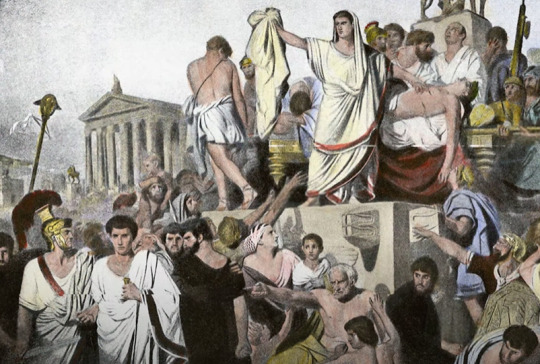
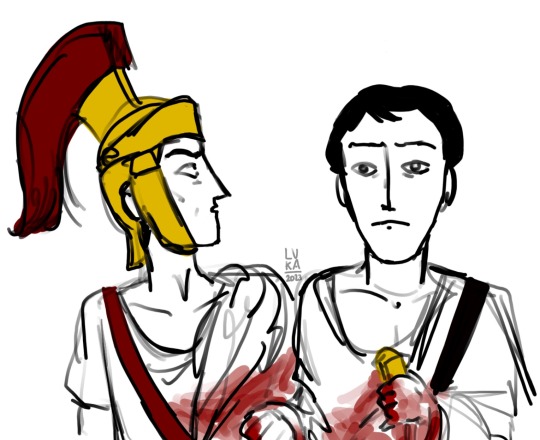
“mark antony’s oration over the body of julius caesar” but for some reason cassius is wearing a super cool helmet
#my art#i was supposed to redraw the whole painting#but nvm#ancient rome#hbo rome#mark antony#marcus junius brutus#gaius cassius longinus#julius caesar#ides of march#silly guys#uhhhhhh#roman republic#and many more tags
65 notes
·
View notes
Text
Reading the Official History of the Australian Imperial Force in Sinai and Palestine.
They hailed [Ahmed Djemal] as the "Saviour of Egypt," and Djemal himself, just before his train started, made this public declaration: "I shall not return to Constantinople until I have conquered Egypt." The whole performance seemed to me to be somewhat bombastic. Inevitably I called to mind the third member of another bloody triumvirate who, nearly two thousand years before, had left his native land to become the supreme dictator of the East, and Djemal had many characteristics in common with Mark Antony. Like his Roman predecessor, his private life was profligate; like Antony, he was an insatiate gambler, spending much of his leisure over the card-table at the Cercle d’0rient. Another trait which he had in common with the great Roman orator was his enormous vanity. The Turkish world seemed to be disintegrating in Djemal’s time, just as the Roman Republic was dissolving in the days of Antony. Djemal believed that he might himself become the heir of one or more of its provinces and possibly establish a dynasty.
Guy who's only heard of the Roman Empire before: "Getting a lot of Roman Empire vibes from this guy"
#Achmed Djemal#Djemal Pasha#WW1#Military History#First World War Official Histories#Henry Somer Gullett
7 notes
·
View notes
Text

gaius marius cannibalistic tyranny moments yet again (pharsalia 2.121-4 trans. wilson joyce)

gaius marius cannibalistic tyranny moments (florus 2.9.14 trans. e.s. forster)
#so there’s definitely some sort of intertextual timeloop going on with antonius orator & marius and cicero & mark antony. right#upon what meat doth this our caesar feed#pharsaliabookclub#beeps
247 notes
·
View notes
Text

Mark Antony giving Caesar’s funeral oration, ca. 44 BC
2 notes
·
View notes
Text
Mark Antony's Funeral Oration for Julius Caesar

Mark Antony's Funeral Oration over the Corpse of Caesar | ca. 1906 Oil on canvas, Robert Seuffert.
The Greek historian Appian of Alexandria (c.95-c.165) has included several speeches in his History of the Civil Wars, all of them being own compositions. However, the speech of Antony is not a composition, but a report of what was said. It is a tempting idea that Appian's account is an accurate rendering of the words that were spoken during Caesar's burial.
When [Caesar's father-in-law] Piso brought Caesar's body into the Forum, a huge number of armed men gathered to guard it. Antony had been chosen to deliver the funeral oration as a consul for a consul, a friend for a friend, and a kinsman for a kinsman and so he again pursued his tactic and spoke as follows:
"It is not right, my fellow-citizens, for the funeral oration in praise of so great a man to be delivered by me, a single individual, instead of by his whole country. The honors that all of you alike, first Senate and then People, decreed for him in admiration of his qualities when he was still alive, these I shall read aloud and regard my voice as being not mine, but yours."
He then read them out with a proud and thunderous expression on his face, emphasizing each with his voice and stressing particularly the terms with which they had sanctified him, calling him "sacrosanct", "inviolate", "father of his country", "benefactor", or "leader", as they had done in no other case. As he came to each of these Antony turned and made a gesture with his hand towards the body of Caesar, comparing the deed with the word.
He also made a few brief comments on each, with a mixture of pity and indignation. Where the decree said "Father of his country", he commented "This is a proof of his mercy", and where it said "Sacrosanct and inviolate" and "Whoever shall take refuge with him shall also be unharmed", he said "The victim is not some other person seeking refuge with him, but the sacrosanct and inviolate Caesar himself, who did not snatch these honors by force like a despot, indeed did not even ask for them. Evidently, we are the most unfree of people because we give such things unasked to those who do not deserve them. But you, my loyal citizens, by showing him such honor at this moment, although he is no more, are defending us against the accusation of having lost our freedom."
And again he read out the oaths, by which they all undertook to protect Caesar and Caesar's person with all their might, and if anyone should conspire against him, those who failed to defend him were to be accursed. At this point he raised his voice very loud, stretched his hand out towards the Capitol, and said, "O Jupiter, god of our ancestors, and ye other gods, for my own part I am prepared to defend Caesar according to my oath and the terms of the curse I called down on myself, but since it is the view of my equals that what we have decided will be for the best, I pray that it is for the best."
Noises of protest came from the Senate at this remark, which was very plainly directed at them. Antony calmed them down, saying by way of retractation, "It seems, fellow-citizens, that what has happened is the work not of any man, but of some spirit. We must attend to the present instead of the past, because our future, and indeed our present, is poised on a knife-edge above great dangers and we risk being dragged back into our previous state of civil war, with the complete extinction of our city's remaining noble families. Let us then conduct this sacrosanct person to join the blest and sing over him the customary hymn and dirge."
So, saying he hitched up his clothing like a man possessed, and girded himself so that he could easily use his hands. He then stood close to the bier as though he were on stage, bending over it and straightening up again, and first of all chanted praise to Caesar as a heavenly deity, raising his hands in witness of Caesar's divine birth and at the same tune rapidly reciting his campaigns and battles and victories, and the peoples he had brought under his country's rule, and the spoils he had sent home. He presented each as a marvel and constantly cried "This man alone emerged victorious over all those who did battle with him."
"And you", he said, "were also the only man to avenge the violence offered to your country 300 years ago, by bringing to their knees the savage peoples who were the only ones ever to break into Rome and set fire to it."
In this inspired frenzy he said much else, altering his voice from clarion-clear to dirge-like, grieving for Caesar as for a friend who had suffered injustice, weeping, and vowing that he desired to give his life for Caesar's. Then, swept very easily on to passionate emotion, he stripped the clothes from Caesar's body, raised them on a pole and waved them about, rent as they were by the stabs and befouled with the dictator's blood. At this the people, like a chorus, joined him in the most sorrowful lamentation and after this expression of emotion were again filled with anger.
After the speech, other dirges accompanied by singing were chanted over the dead by choirs in the customary Roman manner, and they again recited his achievements and his fate. Somewhere in the lament Caesar himself was supposed to mention by name those of his enemies he had helped, and referring to his murderers said as if in wonder,
To think that I actually saved the lives of these men who were to kill me.
Then the people could stand it no longer. They considered it monstrous that all the murderers, who with the sole exception of Decimus had been taken prisoner as partisans of Pompey, had formed the conspiracy when instead of being punished they had been promoted to magistracies, provincial governorships, and military commands, and that Decimus had even been thought worthy of adoption as Caesar's son.
When the crowd were in this state, and near to violence, someone raised above the bier a wax effigy of Caesar - the body itself, lying on its back on the bier, not being visible. The effigy was turned in every direction, by a mechanical device, and twenty-three wounds could be seen, savagely inflicted on every part of the body and on the face. This sight seemed so pitiful to the people that they could bear it no longer. Howling and lamenting, they surrounded the senate-house, where Caesar had been killed and burnt it down, and hurried about hunting for the murderers, who had slipped away some time previously.
#mark antony#marcus antonius#julius caesar#gaius julius caesar#brutus#ides of march#marcus junius brutus#rome#roman history#ancient rome#roman republic#roman empire#this day in history#history
22 notes
·
View notes
Text
my junior year of high school in ap lang & comp we had to stand on our chairs every morning at the beginning of class and recite from memory mark antony's funeral oration (friends romans countrymen) and i tell you what for whatever complaints we had i sure fucking learned about rhetoric; anyway, i would like to submit to english teachers everywhere barbossa's speech at the bretheren court, and as a companion, elizabeth's what shall we die for speech from the third pirates of the caribbean movie
1 note
·
View note